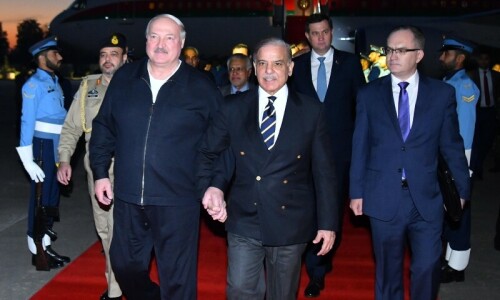 |
Bhai Ghulam Muhammad Chand, one of last masters of Rababi singing tradition of Bhai Mardana, the Muslim companion of Baba Guru Nanak, passed away here in Lahore on April 29. Bhai Mardana was the first Rababi (from musical instrument Rabab) and he had got the title from Baba Nanak.
Bhai Chand was born in 1927 in village Raja Sansai, Amritsar, and spent his childhood there, learning music and travelling along his father Bhai Sunder Giani and uncle Bhai Chaand across Punjab and Peshawar to sing kirtan at gurdwaras and for Sikh nobles. His father and uncle were the last Rababis who performed at the Golden Temple before their migration to Lahore in 1947.
Their lineage is traced to Bhai Sadha and Bhai Madha who sang during the lifetime of last two Sikh gurus, Guru Tegh Bahadur and Gudu Gobind Singh.
“After the partition, Bhai Chand had a difficult life here in Lahore and he lived in anonymity, accompanying qawwali singers or reciting Naats or singing Punjabi Sufi classics,” says Nadeem, his son-in-law and a violinist who used to perform in his Sangat.
“In 2005, Shumita, an Indian, heard Bhai Chand singing in the Baithak of Najm Hosain Syed at the Jail Road where he used to often perform. She took Bhai Chand to India where he was received with open arms,” he says, adding that he was given the Bhai Mardana Award by the Punjabi University, Patiala, that year while he got the Golden Temple Life Achievement Award in 2011 in the UK.
From the Partition until 2005, Bhai Chand lived in rented houses, finding it hard to make both ends meet.
“Shumita, in collaboration with other people in India and the western countries, bought the Bilal Ganj house for Bhai Chand where he lived until his death,” says Nadeem.
“While Shumita took Bhai Chand to India, it was Dr Navtej Purewal from London who recorded Bhai Chand and released his first album, Mitr Pyaray Nu, in the UK,” he says, and added that the second album, Eh Hamara Jevna, was recorded in Lahore but released abroad last year. He was invited to Prime Minister Manmohan Singh’s house by his wife.
Besides getting recognition and awards from India, Bhai Chand received a heartbreak too when he was not allowed to sing at the Golden Temple in 2005 where he used to sing kirtan in the company of his father and uncle.
“He was not allowed to sing there because he was not a Sikh. They put the condition before him to complete five articles of faith of Sikhism to get permission to perform which was not acceptable to him because his family had been singing kirtan since the time of Baba Nanak in their own way, keeping Muslim faith,” says Nadeem.
Bhai Chand trained many of his students in Lahore in kirtan as well as classical singing.
“I got training in kirtan and classical ragas from Baba Ji for four to five years and had a special relationship with him,” says Maham Suhail, a disciple of Bhai Chand.
“He was the last gem of the Rababi Raagis and his rendition of kirtan was so different and unique from other Sikh Shabad kirtan singers as he was carrying the tradition of Bhai Mardana,” she says, adding that Bhai Chand remembered everything that he listened from other masters, including his father and uncle.
“I accompanied Baba Ji in many performances. The last time we performed together was at the All Pakistan Music Conference in Lahore last year,” Maham says.
Nadeem says Bhai Chand was the last custodian of the Rababi tradition though his sons, Naeem (Tabla player) and Moeen (vocalist), would try to keep the tradition intact.
Dr Navtej Purewal, deputy director at the South Asia Institute of the University of London who has done research on Rababis, says most of Rababi Raagis in India had converted to Sikhism after the Partition and they no more remained Rababi as a Rababi kirtan singer must be a Muslim. However, she adds, we cannot call Bhai Chand the last Rababi because his nephew, Amjad, has learnt the art and hopefully he would continue the tradition. She says Bhai Chand’s family was stopped from singing only at Golden Temple though they continued singing kirtans at gurdwaras and it was wrong on the part of some Sikhs to object to the Rababis’ singing at the Golden Temple because Rababis (Muslims) had the blessings of Baba Nanak who had Bhai Mardana as his companion.
She says most of recordings of Bhai Chand’s kirtans are available on the Internet.
Bhai Chand suffered from fever while he had kidney and lung issues too. With all the diseases, his health condition deteriorated and he breathed his last at Mayo Hospital. He was laid to rest at Mian Munshi Graveyard in Bilal Ganj area. Bhai Chand is survived by three daughters and two sons.
His famous compositions included Awal Allah Noor Upaya and Har Ka Bloey Naa.
Published in Dawn, May 7th, 2015
On a mobile phone? Get the Dawn Mobile App: Apple Store | Google Play













































Dear visitor, the comments section is undergoing an overhaul and will return soon.